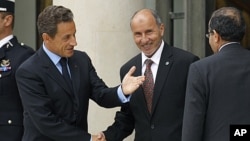Senior officials from 63 countries pledged continuing support for Libya's revolution during a conference in Paris on Thursday, saying that coalition military operations will continue and that billions of dollars of frozen Libyan funds will be released, and humanitarian assistance and nation building efforts will be launched.
If not for the dramatic events of the last six months, Moammar Gadhafi would have marked his 42nd anniversary in power on Thursday. Instead, the former Libyan leader is in hiding and the leaders of the revolution that ousted him received accolades and pledges of support from countries around the world.
Conference co-host President Nicolas Sarkozy of France told a news conference that countries are freeing up Libyan money of yesterday to help build the Libya of tomorrow. He said countries will send doctors, mobile homes to be used as schools and experts to help with Libya's water distribution system. Mr. Sarkozy and co-host British Prime Minister David Cameron said NATO military operations will continue as long as there is a threat from Mr. Gadhafi and his supporters.
“NATO and our allies will continue our operations to implement United Nations Security Council resolutions 1970 and 1973 for as long as we are needed to protect civilian life,” Cameron said.
Mr. Cameron called on Libya's transitional leaders to investigate atrocities committed during the fighting and to bring the perpetrators to justice.
The head of Libya's National Transitional Council, Mustafa Abdullah Jalil, pledged to do that and to build an inclusive democracy. U.S. Secretary of State Hillary Clinton attended the meeting, but did not speak at the news conference.
United Nations Secretary General Ban Ki-moon said the Security Council will move to launch an ambitious and wide-ranging assistance program. Mr. Ban welcomed the participation of some countries he said had been reluctant to support Libya's revolution in the past.
Officials particularly praised the Arab countries that participated in the military coalition and noted the large number of countries that came to the conference.
But Middle East expert Nicola Pratt at Britains' Warwick University notes that support for Libya's revolution is not universal.
"There are still a lot of countries that haven’t recognized the NTC, so I wouldn’t say that there’s a whole international rush of support for the NTC. But there is definitely a lot of interest among those countries that have played a leading role in getting rid of Gadhafi," Pratt said.
Leaders at the conference acknowledged that, and called on countries that did not attend the meeting, notably South Africa, to change their policies toward Libya.
International Conference Pledges Support for Libya




